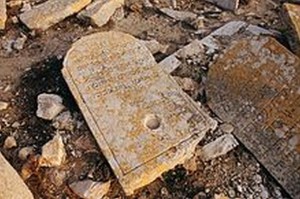 Amman, Jordan, November 13 – A leading Sunni preacher in the Hashemite Kingdom of Jordan made waves today by floating the notion that Islam might take a kind view of treating the grave markers of Jews with respect.
Amman, Jordan, November 13 – A leading Sunni preacher in the Hashemite Kingdom of Jordan made waves today by floating the notion that Islam might take a kind view of treating the grave markers of Jews with respect.
Hassan Ali Al-Hajez of the capital city’s Ibrahimi Mosque shocked worshipers during his sermon by suggesting the possibility that the tombstones of Jews deserve a fate other than being overturned, smashed, defaced with graffiti, or used in the construction of latrines. Hajez further invoked Islamic texts and scholars to support his idea, but was unable to complete his address before being hounded from the room and pelted with books.
Hajez’s fellow clerics were quick to distance themselves from his remarks, and insisted that he must have spoken on a theoretical plane. “Imam Hassan’s words were taken out of context, we are certain,” said his colleague Omar Sulemain. “There is no other way to account for anyone voicing the sacrilegious, offensive, and downright blasphemous idea that Jewish graves should be treated with anything but contempt.”
Although more common in Europe than in the Middle East, the largest-scale systematic use of grave desecration since the Second World War occurred under Jordanian auspices. After the Jordanian Arab Legion ousted Jewish fighters and residents from the eastern portion of Jerusalem in 1948, Jordanian soldiers and civilians spent years using the tombstones of the venerable Jewish cemetery on the Mount of Olives as paving stones, steps, outhouse stones, and other degrading purposes.
If corroborated, Imam Hajez’s statements would represent a significant departure from Islamic practice in general. While Muslim activists and leaders consistently protest Jewish pilgrims’ walking on the Temple Mount, near the Al Aqsa Mosque, as a “desecration” of the holy site, in fact the everyday activities of Muslims themselves on the plateau consist of behaviors not generally associated with reverence: football, summer camps, picnics, and the like. Asserting, or even implying, that respectful behavior is to be expected or welcomed in connection with Jewish tombs would necessarily require a reassessment of widespread conduct in purely Islamic contexts. Such ramifications constitute a serious challenge to Islamic sensibilities, says scholar Ida Lottrie.
“Under Islamic rule, few ostensibly revered places are actually maintained and built up unless somebody else is interested in them,” notes Lottrie. “The Jordanians themselves didn’t give Jerusalem any special status or treatment while the city was under its occupation – and the same went for most of the other Muslim rulers who controlled Jerusalem. It was primarily in conflict with other societies that they gave the city any sustained attention – otherwise the place was a backwater. So it would be a real challenge to Muslims in general if this imam’s idea were applied across the board.”
“It would require them to show consistency,” notes Lottrie. “And that thought is too much for Islamic society to bear.”




